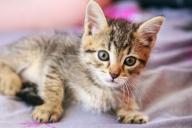Kids often dream about keeping dangerous wild animals as pets - alligators, tigers, wolves.
While some species can be (and usually already are) domesticated, some animals seem to stay wild forever.
Here are a few reasons, why.
Genetics and Behavior
Animals that are naturally aggressive, highly territorial, or have strong flight responses are more challenging to domesticate.
Domestication requires selecting for traits such as docility, adaptability, and social behavior, which may not be present in certain species.

Dietary Requirements
Certain species have specific feeding habits, rely on unique food sources, or have complex digestive systems that make it difficult to provide a suitable diet in captivity.
Social Structure
Animals with intricate social structures or strong hierarchical systems may struggle to adapt to domestication.
Maintaining their social dynamics, including complex social interactions and hierarchies, can be challenging in captive environments.
Space and Environment
Animals that rely on extensive ranges, seasonal migrations, or complex natural habitats may suffer physical and psychological stress when confined to limited spaces.
Lack of Genetic Plasticity
Some species have limited genetic plasticity, meaning they have a limited ability to undergo rapid and significant genetic changes necessary for domestication.









